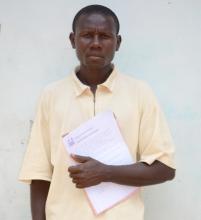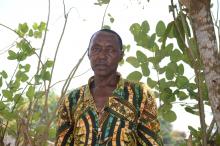Health worker heroes at the frontline of the Ebola crisis

By Philip Carroll, Save the Children
The Ebola outbreak which started in south eastern Guinea in early 2014, has now spread to Liberia, Sierra Leone, Nigeria and Senegal. Ebola has highlighted the devastating impact that a crisis can have on an already fragile health system and has also highlighted the life-saving and heroic work of frontline health workers, who are risking their own lives to protect and save the lives of vulnerable children in remote communities.
Francis Vandy Rogers is a trained community health worker and a carpenter. Francis, his wife and four children are temporarily displaced as a result of a fire outbreak that burnt down their thatch roofed house and 14 other houses in the town in April 2013. They are currently residing at the community training center – temporarily given to him as a result of his active role in the community – while reconstructing their house. Their main sources of water for drinking and other domestic uses are boreholes with hand pump and streams.
Every morning Francis carries his tools box and First Aid box to his workshop where the community people meet him for primary health service while doing his carpentry work. “Usually when they come for treatment I’d leave the wood work, get my hands washed and attend to them then I get back to work,” says Francis.
Francis explains the importance of the training and how he is helping the community. He says, "This training is useful because our people say ‘Korglor yia laygor eh kpokowa’ (translation: Information about an impending war can save the aged from being killed). If God has made it possible to get information about this killer disease they call Ebola, we should do everything within our power to put a bearer before it, especially when they have told us that it is not far from us. I learnt a lot about the prevention of this disease, which I’m going to sensitize my community members seriously about it.”
Francis continued, “First, we are going to ask the town chief to call all the people through the town crier to a meeting so that we can have the opportunity to sensitize everybody. Then we will continue with one on one sensitization and in the event of suspected case, we will immediately report to the health center. From what I learnt in the training, Ebola is a very serious disease that can kill very fast so even the sensitization method and message will be serious so that the people themselves should know that this a serious and must take it seriously."
Another inspiring example of a heroic health worker is Lansana Fofanah, who is a farmer and a trained community health worker. Lansana and his wife have five children, two of which are living in kinship care. On a typical farming day, Lansana leaves his house very early in the morning and spends rest of the day and returns late in the evening to catch up with the Muslim congregational prayer. Lansana usually reserves a day or two in a week to do his community health services.
Talking about the training and how he plans to sensitize the community, Lansana says, "This training is very good and I consider it as an empowerment to save lives in our communities. Because prevention is the best solution to this Ebola disease. I have also learnt about the causes its signs and symptoms when someone is infected. We should always refer the Ebola patient immediately to the [primary health unit] to avoid its transfer to another person in the community.”
He adds, “I am going to call my community people to a meeting and I will explain to them the dangers of this disease. Because this Ebola does not have medicine and the only solution is prevention so we must abide by all the preventive rules such as stop eating dead animals, monkeys, baboons and bats and even fruits that have been eaten by these animals. Through this we can prevent the Ebola in our communities."
This is the first time Francis and Lansana have been trained to carryout sensitization on Ebola virus prevention awareness and emergency preparedness.


